The NZAS Medals for 2021 were presented on 15 November 2021, following the Association's online Conference and AGM. Ceremonies in Dunedin, Wellington and Auckland were connected via Zoom. Co-Presidents Troy Baisden (on screen) and Lucy Stewart present the Shorland Medal to Mike Berridge (right). More pictures of the ceremonies are below the citations.
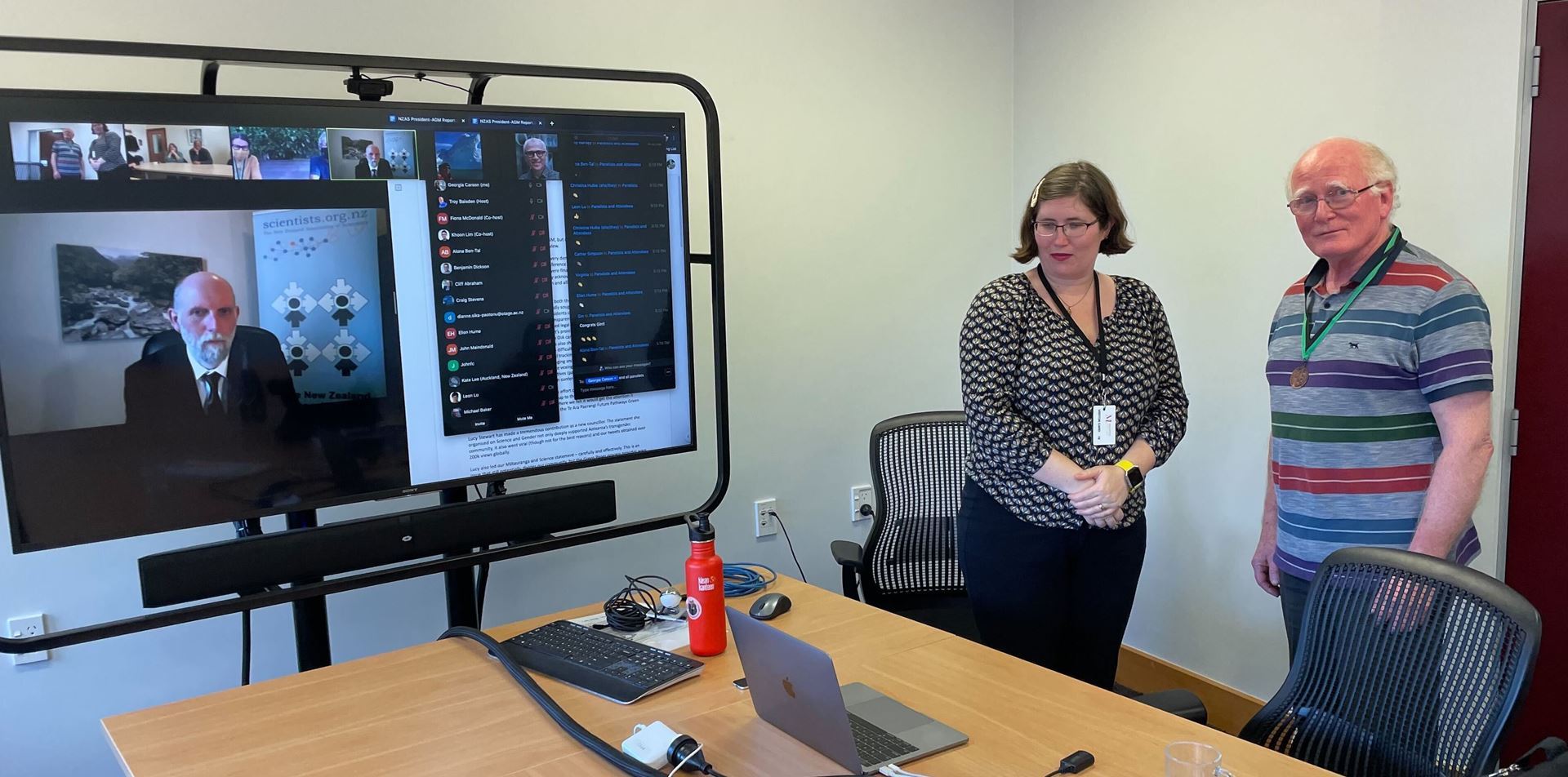
Marsden Medal 2021
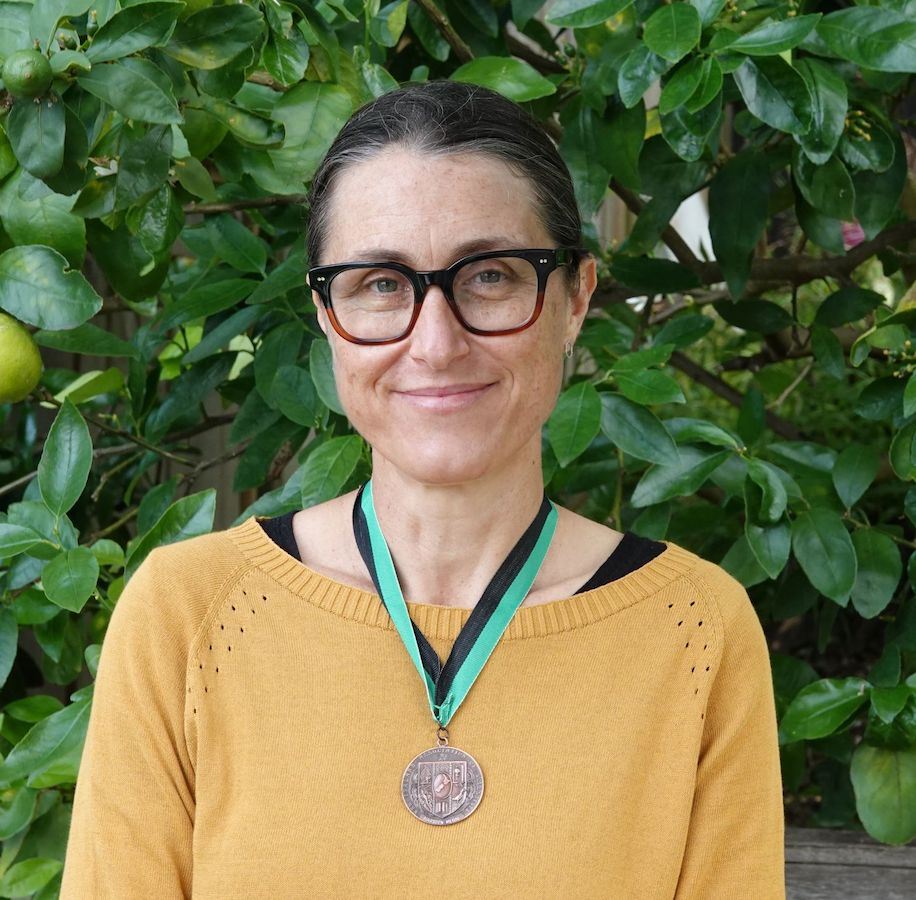 Professor Virginia Braun (University of Auckland) has been awarded the 2021 Marsden Medal in recognition of her global impact on the development of qualitative empirical methods and for the generosity of spirit she expresses through this work. In a ground-breaking 2006 paper co-authored with Associate Professor Victoria Clarke, Professor Braun articulated thematic analysis as a systematic approach for generating and analysing data from textual sources, independent of any particular theoretical or epistemological framework. Prior to this contribution, thematic-analysis methods were idiosyncratic, often inscrutable, and subject to criticism on this basis. The paper laid out a rigorous yet versatile foundation that was accessible and useful to scholars working in a wide range of disciplines. It established the clear, step-by-step approach that characterises thematic analysis today. As counted by Google Scholar, Braun and Clarke (2006) has been cited more than 100,000 times, at a rate that continues to grow, nearly exponentially. Professor Braun has been equally innovative in her engagement with other qualitative methods, including virtual techniques, purely qualitative surveys and story completion. These methods are applied in her highly-cited research around gendered bodies, sex, sexuality and health, all of which illuminates and explores the complexity of the human experience. Professor Braun’s commitment to the accessibility of qualitative methodologies is equally commendable. It is expressed through her pedagogical research, professional-development workshops on the teaching and supervision of thematic analysis, open-access websites, recorded public lectures, social-media engagement, and numerous editor and editorial-board roles. The companion website to the award-winning book “Successful Qualitative Research: A Practical Guide for Beginners” (Braun and Clarke, 2013) is one of the largest open-access resources for teaching qualitative-research methods. In all aspects of her work, Professor Braun encourages us to think deeply, reflexively and inclusively about the processes of knowledge generation. Her guidance to foreground, and make careful use of, our research values may be most readily appreciated by colleagues in the social and health sciences but is relevant to every scientist in every field of enquiry.
Professor Virginia Braun (University of Auckland) has been awarded the 2021 Marsden Medal in recognition of her global impact on the development of qualitative empirical methods and for the generosity of spirit she expresses through this work. In a ground-breaking 2006 paper co-authored with Associate Professor Victoria Clarke, Professor Braun articulated thematic analysis as a systematic approach for generating and analysing data from textual sources, independent of any particular theoretical or epistemological framework. Prior to this contribution, thematic-analysis methods were idiosyncratic, often inscrutable, and subject to criticism on this basis. The paper laid out a rigorous yet versatile foundation that was accessible and useful to scholars working in a wide range of disciplines. It established the clear, step-by-step approach that characterises thematic analysis today. As counted by Google Scholar, Braun and Clarke (2006) has been cited more than 100,000 times, at a rate that continues to grow, nearly exponentially. Professor Braun has been equally innovative in her engagement with other qualitative methods, including virtual techniques, purely qualitative surveys and story completion. These methods are applied in her highly-cited research around gendered bodies, sex, sexuality and health, all of which illuminates and explores the complexity of the human experience. Professor Braun’s commitment to the accessibility of qualitative methodologies is equally commendable. It is expressed through her pedagogical research, professional-development workshops on the teaching and supervision of thematic analysis, open-access websites, recorded public lectures, social-media engagement, and numerous editor and editorial-board roles. The companion website to the award-winning book “Successful Qualitative Research: A Practical Guide for Beginners” (Braun and Clarke, 2013) is one of the largest open-access resources for teaching qualitative-research methods. In all aspects of her work, Professor Braun encourages us to think deeply, reflexively and inclusively about the processes of knowledge generation. Her guidance to foreground, and make careful use of, our research values may be most readily appreciated by colleagues in the social and health sciences but is relevant to every scientist in every field of enquiry.
Hill Tinsley Medal 2021
 Associate Professor Priscilla Wehi (Centre for Sustainability, University of Otago) is a conservation biologist and ethnobiologist, and Director of Te Punaha Matatini Centre of Research Excellence in Complex Systems. She is a leading figure in the field in Aotearoa New Zealand, pioneering innovative research at the intersection of science and indigenous knowledge. As such, Dr Wehi engages with some of the most challenging conservation issues that confront humanity globally, focusing on the links between culture, biodiversity, and ecological restoration. Her research is cross-disciplinary incorporating humanities and western science, picking the best of both quantitative and qualitative approaches in learning how the world works. She uses scientific tools such as stable isotope analysis to recover information about past relationships between humans and nature and has published widely on New Zealand ecology with 21 publications in the last three years. Dr Wehi is passionate about inclusivity and diversity in science and has undertaken extensive work with Māori communities with her work pushing traditional disciplinary boundaries, incorporating the needs and aspirations of communities. Her natural curiosity and open approach to multiple ways of knowing make her a role model and natural leader for many emerging scholars who seek to work in a cross-cultural way. She is also a member of the Predator-Free 2050 Bioethics Panel and a Rutherford Discovery Fellowship recipient in 2014.
Associate Professor Priscilla Wehi (Centre for Sustainability, University of Otago) is a conservation biologist and ethnobiologist, and Director of Te Punaha Matatini Centre of Research Excellence in Complex Systems. She is a leading figure in the field in Aotearoa New Zealand, pioneering innovative research at the intersection of science and indigenous knowledge. As such, Dr Wehi engages with some of the most challenging conservation issues that confront humanity globally, focusing on the links between culture, biodiversity, and ecological restoration. Her research is cross-disciplinary incorporating humanities and western science, picking the best of both quantitative and qualitative approaches in learning how the world works. She uses scientific tools such as stable isotope analysis to recover information about past relationships between humans and nature and has published widely on New Zealand ecology with 21 publications in the last three years. Dr Wehi is passionate about inclusivity and diversity in science and has undertaken extensive work with Māori communities with her work pushing traditional disciplinary boundaries, incorporating the needs and aspirations of communities. Her natural curiosity and open approach to multiple ways of knowing make her a role model and natural leader for many emerging scholars who seek to work in a cross-cultural way. She is also a member of the Predator-Free 2050 Bioethics Panel and a Rutherford Discovery Fellowship recipient in 2014.
Shorland Medal 2021
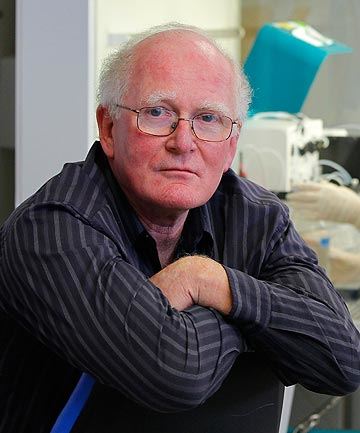 Professor Mike Berridge (Malaghan Institute) has led the Cancer Cell Biology research programme at the Malaghan Institute of Medical Research since his return to Wellington in 1976. Within the fields of blood cell development, stem cell characterization and cancer biology he has made major contributions to basic understanding of cellular processes that underpin development of disease, culminating in the discovery that mitochondria, with their mitochondrial genome, transfer from normal cells to adjacent tumour cells devoid of mitochondrial DNA. This research challenged the paradigm that genes are constrained within mammalian cells. In recognition of this ground-breaking discovery, Dr Berridge was awarded the Liley Medal in 2016 by the Health Research Council of New Zealand for this key contribution to health and medical sciences in the field of cellular metabolism. Dr Berridge has given outstanding service to the wider sciences in New Zealand, as New Zealand Association of Scientists’ President from 2000-2002, as an elected member of the NZAS Council from 1990 to 2019, as a major contributor alongside Brian Shorland on science policy issues, including consecutive National Surveys of Scientists, and as a longstanding member of the Editorial Board of the NZ Science Review.
Professor Mike Berridge (Malaghan Institute) has led the Cancer Cell Biology research programme at the Malaghan Institute of Medical Research since his return to Wellington in 1976. Within the fields of blood cell development, stem cell characterization and cancer biology he has made major contributions to basic understanding of cellular processes that underpin development of disease, culminating in the discovery that mitochondria, with their mitochondrial genome, transfer from normal cells to adjacent tumour cells devoid of mitochondrial DNA. This research challenged the paradigm that genes are constrained within mammalian cells. In recognition of this ground-breaking discovery, Dr Berridge was awarded the Liley Medal in 2016 by the Health Research Council of New Zealand for this key contribution to health and medical sciences in the field of cellular metabolism. Dr Berridge has given outstanding service to the wider sciences in New Zealand, as New Zealand Association of Scientists’ President from 2000-2002, as an elected member of the NZAS Council from 1990 to 2019, as a major contributor alongside Brian Shorland on science policy issues, including consecutive National Surveys of Scientists, and as a longstanding member of the Editorial Board of the NZ Science Review.
Cranwell Medal 2021
 Professor Michael Baker is among New Zealand’s most dedicated and effective science communicators. He is a public health medicine specialist and professor of public health at the University of Otago and is passionate about opportunities to organise society in ways that promote health, equity and sustainability. Professor Baker is a leading health researcher, including principal investigator on an HRC funded research programme, and projects on rheumatic fever and Covid-19 and has worked internationally with the World Health Organisation. He has been a prominent science communicator throughout his career. His work during 2020-21 has been dominated by assisting with the Covid-19 pandemic response, including membership of the Ministry of Health’s Covid-19 Technical Advisory Group and advocacy for the Covid-19 elimination strategy. Professor Baker is a member of the Advisory Board of the Science Media Centre, directs the long-running Public Health Summer School, and is developing a new Public Health Communication Centre. Professor Baker’s work on public health, and the Covid-19 response in particular, was recognised by a number of recent awards including: the Critic and Conscience of Society Award, the Public Health Champion Award, becoming a Member of the NZ Order of Merit (MNZM), the 2020 Wellingtonian of the Year, and the Prime Minister’s Science Communication Prize in 2021. Professor Baker is a very worthy winner of the 2021 NZAS Cranwell Medal.
Professor Michael Baker is among New Zealand’s most dedicated and effective science communicators. He is a public health medicine specialist and professor of public health at the University of Otago and is passionate about opportunities to organise society in ways that promote health, equity and sustainability. Professor Baker is a leading health researcher, including principal investigator on an HRC funded research programme, and projects on rheumatic fever and Covid-19 and has worked internationally with the World Health Organisation. He has been a prominent science communicator throughout his career. His work during 2020-21 has been dominated by assisting with the Covid-19 pandemic response, including membership of the Ministry of Health’s Covid-19 Technical Advisory Group and advocacy for the Covid-19 elimination strategy. Professor Baker is a member of the Advisory Board of the Science Media Centre, directs the long-running Public Health Summer School, and is developing a new Public Health Communication Centre. Professor Baker’s work on public health, and the Covid-19 response in particular, was recognised by a number of recent awards including: the Critic and Conscience of Society Award, the Public Health Champion Award, becoming a Member of the NZ Order of Merit (MNZM), the 2020 Wellingtonian of the Year, and the Prime Minister’s Science Communication Prize in 2021. Professor Baker is a very worthy winner of the 2021 NZAS Cranwell Medal.
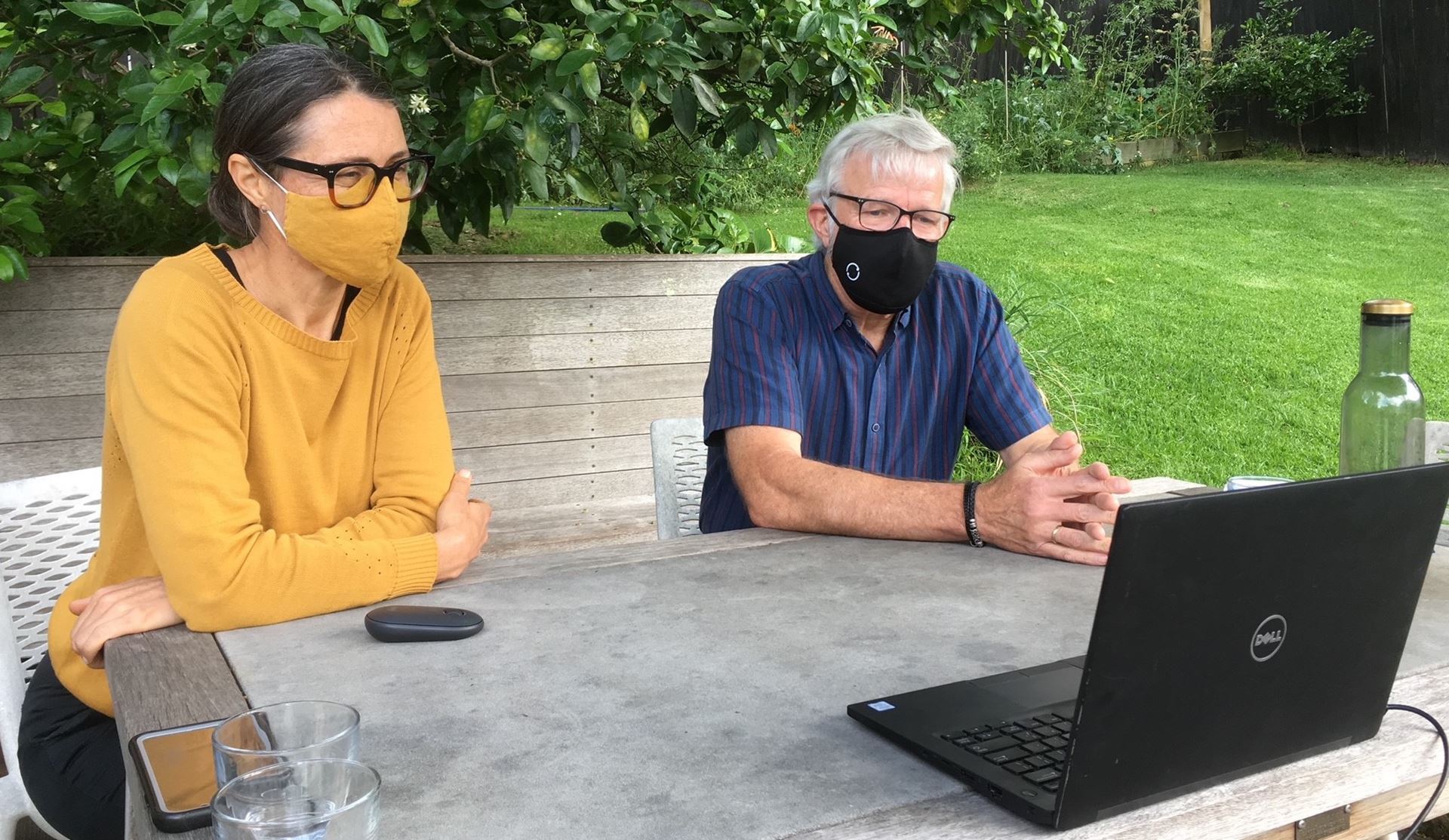
The outdoor Auckland ceremony under the current Covid Level 3 step 2 settings: Marsden Medallist Virginia Braun and NZAS' Peter Buchanan watch the proceedings on Zoom.
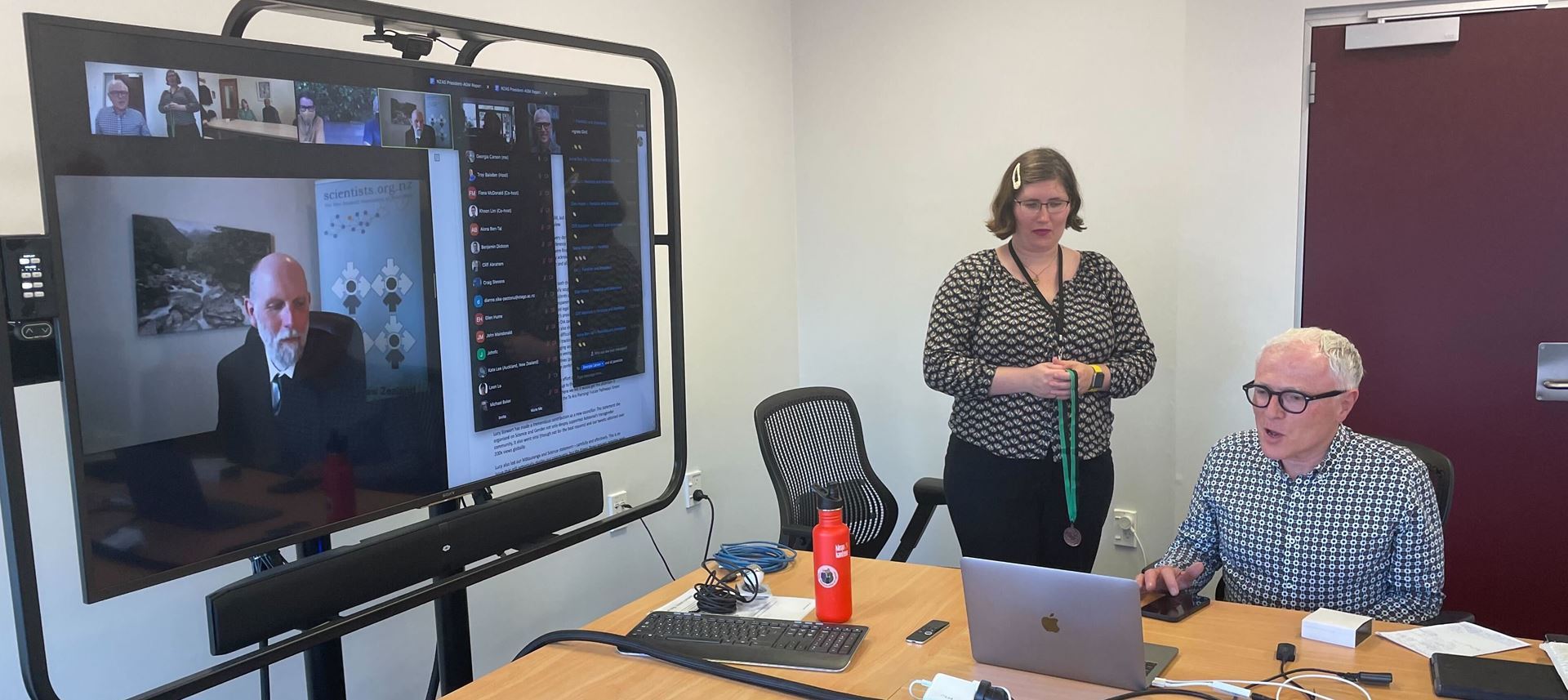
Co-Presidents Troy Baisden (on screen) and Lucy Stewart present the Cranwell Medal to Michael Baker (right).
© 2024 NZAS | Disclaimer Sitemap |